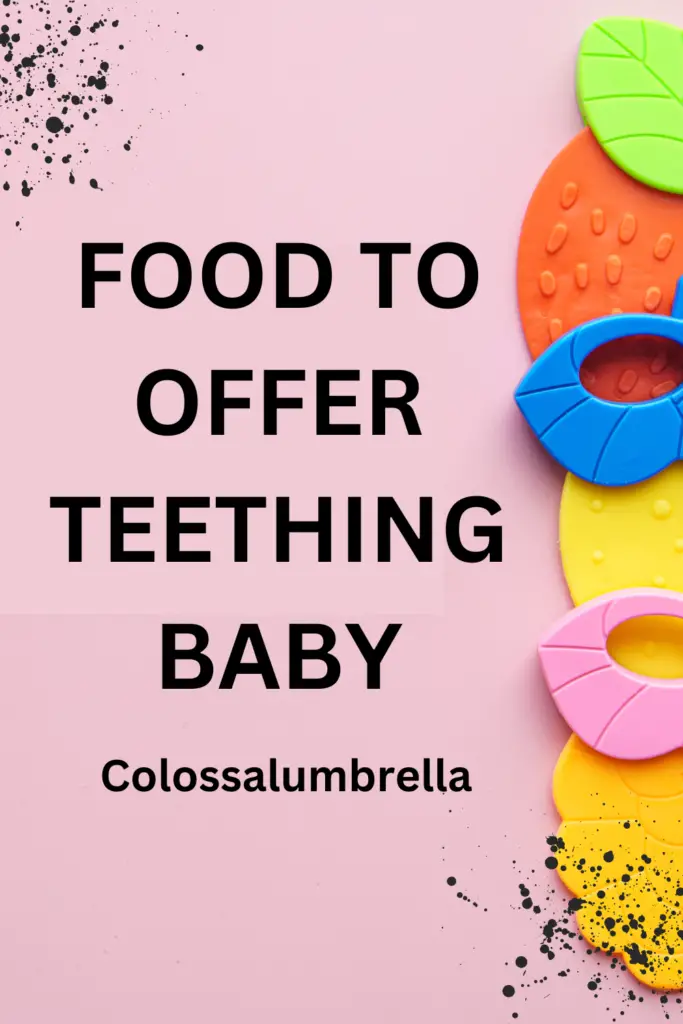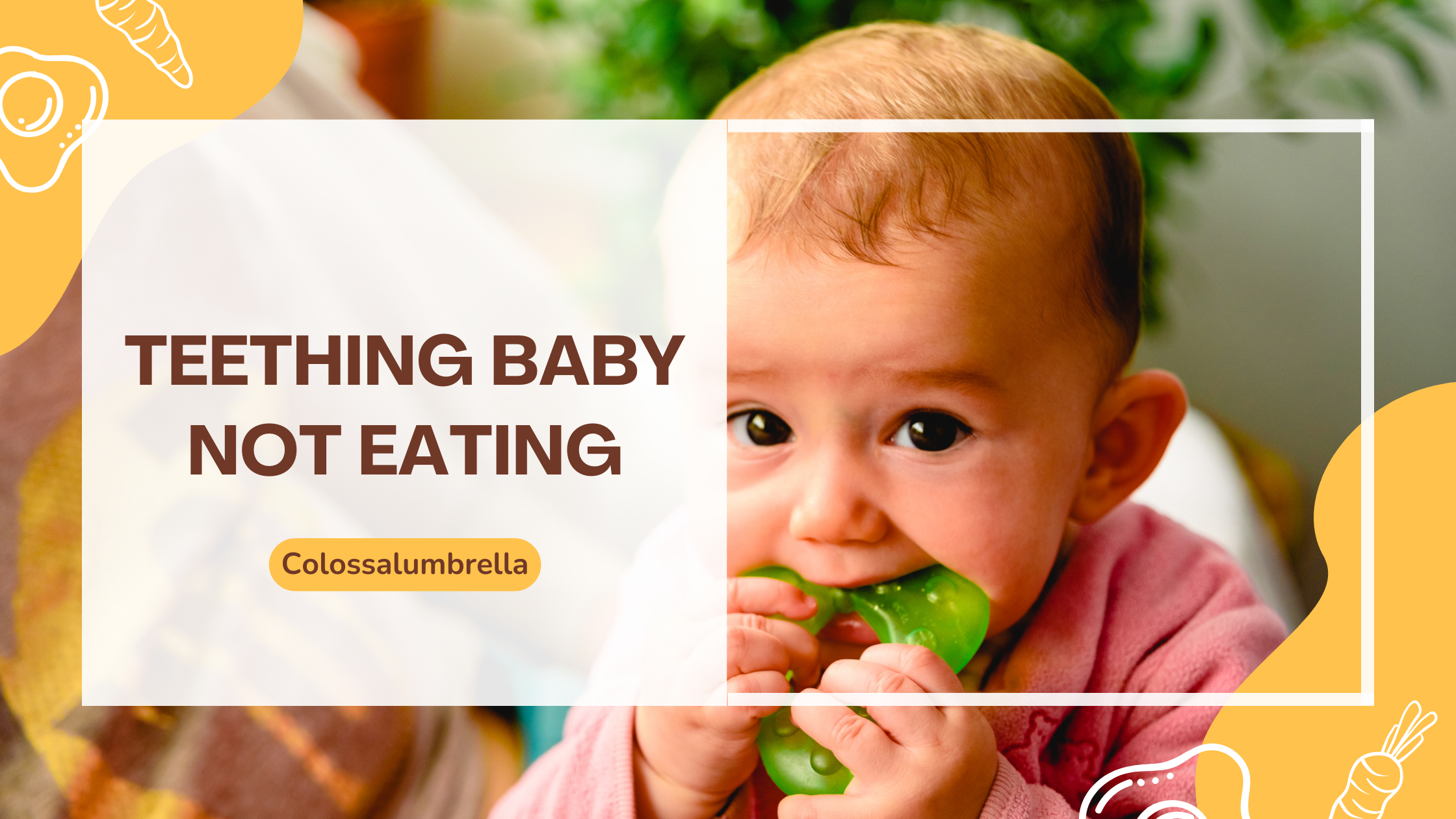Contents
Teething is that magical time in a baby’s life when they transform from a drooling ball of cuteness to a screaming, sleepless, and cranky little monster. As if that wasn’t enough, teething can also wreak havoc on a baby’s appetite, leaving parents scratching their heads (and wiping up spit-up) in frustration.
But like everything in life, there is a solution to every problem. I am going to talk about how to tackle the age-old problem of a ‘teething baby not eating’. Because let’s face it, there’s nothing more stressful than trying to convince a tiny human with two teeth to eat something other than your finger.
Let us dive into the wonderful world of teething and eating. Don’t worry, we’ll get through this together. As the famous philosopher and parent, Anonymous, once said, ‘Teething: when sleep is for the weak and coffee is for the desperate.
Signs and Symptoms of teething
Ah, teething. It’s like a rite of passage for babies and a test of endurance for parents. But let’s face it, some of the symptoms of teething are just downright hilarious.
First up, we’ve got drooling. And I’m not talking about a cute little dribble here and there. Oh no, I’m talking about a full-blown waterfall of saliva that would make Niagara Falls jealous. It’s like your baby’s mouth has become a leaky faucet, and there’s no end in sight. Don’t believe me? Just try holding your little one without a bib for more than 30 seconds. I dare you.
Next on the list is swollen and tender gums. This can make it difficult for babies to eat, which can lead to some pretty comical mealtime moments. Ever tried to spoon-feed a teething baby? It’s like trying to feed a hungry crocodile – you better watch your fingers!
And speaking of hungry crocodiles, let’s talk about chewing and biting. When babies are teething, they’ll chew on just about anything they can get their little hands on. Toys, fingers, toes, you name it. It’s like they’re auditioning for a role in a new horror movie called “Attack of the Teething Babies”.
And let’s not forget about the ear pulling. Who knew that teething could cause ear pain? Apparently, babies did. And they’re not shy about letting us know.
Why Teething Baby Not Eating?
Teething strikes! It’s like a tiny little monster that takes over your sweet little baby and turns them into a picky eater. There are some perfectly logical reasons why your teething baby may not be eating.
First up, we’ve got swollen and tender gums. Think about it, if someone was poking and prodding at your gums, you probably wouldn’t be too keen on chowing down on a juicy steak, either. And let’s not forget about the pain. Teething can cause some serious discomfort, which can make it tough for babies to open their mouths wide enough to eat.
And then there’s the drooling. Oh, the drooling. It’s like your baby’s mouth has turned into a faucet, and they just can’t seem to turn it off. This excess saliva can make it tough for them to swallow food and can even cause nausea or vomiting in some cases. It’s like they’re saying, “Thanks for the food, Mom and Dad, but I think I’ll just stick with this drool for now.”
Lastly, let’s not forget that some babies are just more sensitive to teething than others. While some babies may breeze through the teething process with no problems, others may be more affected and may need a little extra TLC during this time.
Teething loss of appetite how long will it last
The duration of loss of appetite during teething can vary from baby to baby. Some babies may only experience a decrease in appetite for a few days, while others may continue to have feeding difficulties for several weeks.
It’s important to remember that teething is a process and can be unpredictable. Your baby’s appetite may fluctuate throughout this period, with some days being better than others.
If you’re concerned about your baby’s loss of appetite or if it lasts for an extended period of time, it’s important to speak with your pediatrician. They can help determine if there are any underlying health issues that may be contributing to the feeding difficulties and provide guidance on how to help your baby through the teething process.
In the meantime, continue to offer soft, easy-to-eat foods and be patient with your little one. This too shall pass!
Teething Baby Not Eating
Foods to Offer a Teething Baby
When your baby is teething, it’s important to offer them foods that are easy to eat and won’t cause any additional discomfort. Soft, pureed or mashed foods are a good option, as they require minimal chewing and won’t irritate your baby’s gums. Here are some ideas:
- Applesauce or mashed bananas: These soft, smooth fruits are easy for babies to eat and provide plenty of vitamins and nutrients.
- Cooked and mashed sweet potatoes: These are a great source of vitamins and fiber, and their soft texture is perfect for teething babies.
- Yogurt or pureed cottage cheese: These dairy products provide protein and calcium, and their creamy texture is soothing for sore gums.
- Cooked and mashed carrots or butternut squash: These vegetables are packed with vitamins and minerals and are easy to digest.
- Oatmeal or rice cereal: These are great options for breakfast or snack time, as they are soft and easy to swallow.

Pain Relief Options for Teething Babies
There are several pain relief options that you can try to help soothe your baby’s sore gums during teething. Some of these options include:
- Teething toys – There are many teething toys available that are designed to be chewed on and can help relieve pain.
- Cold washcloth – Soak a washcloth in cold water and place it in the fridge for a few minutes. Then give it to your baby to chew on.
- Over-the-counter pain relievers – There are several over-the-counter pain relievers that are safe for babies to use. However, it is important to follow the dosage instructions carefully.
- Teething gels – There are also teething gels available that can help soothe sore gums. However, it is important to check with your pediatrician before using these products.
How Long Does It Take for a Baby Tooth to Break Through?
Once a baby tooth starts to emerge, it can take anywhere from a few days to a few weeks for it to fully break through the gums. During this time, your baby may be fussy and irritable, and their gums may be sore and tender. However, once the tooth has fully emerged, your baby should start to feel better and their eating habits should return to normal.
When to seek medical help
While teething can be uncomfortable and may cause some changes in your baby’s eating habits, it’s typically not a cause for alarm. However, there are some instances where you may want to seek medical help:
- High fever: If your baby’s temperature rises above 100.4°F (38°C), it could be a sign of infection or another underlying health issue. This is especially concerning if it lasts for more than a day or two.
- Refusal to eat: While a decrease in appetite is common during teething, if your baby is refusing to eat or is experiencing significant weight loss, it’s important to speak with your pediatrician.
- Diarrhea or vomiting: If your baby is experiencing frequent diarrhea or vomiting, it could be a sign of an underlying infection or illness.
- Excessive drooling: While drooling is a normal part of teething, if it’s causing a rash or irritation around your baby’s mouth, it’s important to seek medical help.
- Excessive fussiness or crying: While some irritability is common during teething, if your baby is experiencing excessive fussiness or crying, it’s important to speak with your pediatrician. This could be a sign of an underlying health issue or other concern.
Teething Baby Not Eating
Conclusion
Well, we’ve reached the end of our baby teething journey together. And what a ride it’s been! We’ve talked about everything from drool to diarrhea (sorry about that), and hopefully, we’ve provided some helpful tips for getting your teething baby to eat.
Remember, teething may be a pain in the gums, but it’s a temporary stage that every baby goes through. And let’s face it, those toothy grins are worth the trouble.
Just think of teething as a kind of baby boot camp. Your little one is building up their chomping muscles for all the delicious food they’ll be eating in the years to come. So go ahead and offer them some soft, pureed or mashed foods, and watch those tiny teeth come in!
Teething Baby Not Eating
I hope you’ve enjoyed reading this article and that it’s provided some laughs and useful information. If you have any more teething woes, don’t hesitate to reach out to your fellow parents or pediatrician for support.
I would stay connected and keep you updated with parenting tips, pregnancy guides, creative ideas, easy crafts, and Free Printables. Subscribe to Colossalumbrella to get new ideas delivered to your inbox. Follow me on Facebook, Pinterest, Twitter, and Instagram.

One thought on “Teething Baby Not Eating? 5 Healthy Items for your baby”